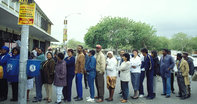
Sharing a Common Destiny
Everyone speaks of the 1994 general election which transformed South Africa from a deeply racist authoritarian society into a non-racial democracy as a miracle. Days before the election rabid members of the militarist neo-Nazi AWB, the Afrikaner Weerstandsbeweging (Afrikaner Resistance Movement) waged an orgy of the bombing which slaughtered and maimed scores of people.
It was a desperate bid to stave off the election which they saw as signalling the end of their privileged lifestyle if not their extinction as a people. Mandela and the government refused to be intimidated and the election went on. But the murderous offensive caused considerable loss of life and destruction to property.
The election took place in an aura of unprecedented goodwill and cooperation between the races. Nothing like it had ever been seen before in South Africa. It was almost as if whites and blacks discovered themselves for the first time as people sharing a common destiny. The master and servant relationship which had held both in bondage for centuries appeared to disappear as if it had never been.
30 Years Earlier
Despite the headiness of the occasion, President Mandela would have been less than human if he had not let his thoughts stray back to that Monday in April 1964 — almost exactly 30 years earlier — when he stood in the dock to begin his defence on the charges of sabotage during what became known as the Rivonia Trial.
That was the time when, in a hushed court, he read out for four hours a statement in the full knowledge that sabotage was a capital offence and that what he was saying could put a noose around the necks of him and his colleagues. He ended, "I have fought against white domination and I have fought against black domination.
I have cherished the ideal of a democratic and free society in which all persons live together in harmony and with equal opportunities. It is an ideal which I hope to live for and to see realised. But, my Lord, if need be it is an ideal for which I am prepared to die."
 SouthAfrica.co.za hosted a photo exhibition on the legendary photojournalist Peter Magubane’s 100 best photos of Nelson Mandela, as the wo...
SouthAfrica.co.za hosted a photo exhibition on the legendary photojournalist Peter Magubane’s 100 best photos of Nelson Mandela, as the wo... Ordinary South Africans became involved in public consultations to make and finalise the designs for our new National Symbols....
Ordinary South Africans became involved in public consultations to make and finalise the designs for our new National Symbols....